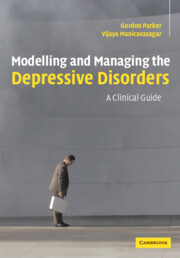Book contents
- Frontmatter
- Contents
- Acknowledgements
- Introduction
- Part I The current model for depressive disorders and its impact on clinical management
- Part II The diagnosis and management of melancholic and psychotic depression
- 4 Management of melancholic depression
- 5 Management of psychotic depression
- 6 Bipolar melancholic or psychotic depression
- Part III An introduction to non-melancholic depression
- Part IV Modelling and managing the non-melancholic depressive disorders
- Appendix 1 The DMI-18 and the DMI-10
- Appendix 2 The CORE system of measuring psychomotor disturbance
- Appendix 3 The temperament and personality measure
- References
- Index
4 - Management of melancholic depression
from Part II - The diagnosis and management of melancholic and psychotic depression
Published online by Cambridge University Press: 17 August 2009
- Frontmatter
- Contents
- Acknowledgements
- Introduction
- Part I The current model for depressive disorders and its impact on clinical management
- Part II The diagnosis and management of melancholic and psychotic depression
- 4 Management of melancholic depression
- 5 Management of psychotic depression
- 6 Bipolar melancholic or psychotic depression
- Part III An introduction to non-melancholic depression
- Part IV Modelling and managing the non-melancholic depressive disorders
- Appendix 1 The DMI-18 and the DMI-10
- Appendix 2 The CORE system of measuring psychomotor disturbance
- Appendix 3 The temperament and personality measure
- References
- Index
Summary
Introduction
We view melancholic depression as a quintessential biological ‘disease’, and therefore preferentially responsive to biologically weighted treatments. As noted earlier, episodes may be precipitated or triggered by stressors such as interpersonal or work crises (and particularly those occurring early on in the life of the disorder), or may occur without any seeming trigger (i. e. ‘endogenous’ in the old terminology). For some individuals, there may be a seasonal predilection, with episodes being more likely to occur in spring, perhaps because of the rapid increase in luminosity stimulating the pineal gland. The point here is that ‘stressors’ may operate across a number of parameters.
For those with a lifetime unipolar course (episodes of melancholic depression only and no ‘highs’), onset is rare at a young age, with episodes being more likely to commence in middle age or later. In those whose lifetime course is bipolar, episodes of melancholic or psychotic depression can occur at a much younger age, including in the teen years. We have a working principle (which, like most principles, is waiting rejection by a rush of exceptions) that: an episode of melancholic or psychotic depression in an individual aged less than 40 years of age is indicative of bipolar disorder being either present or being likely in the future. For such young subjects, we encourage close questioning about features of ‘highs’.
Information
- Type
- Chapter
- Information
- Modelling and Managing the Depressive DisordersA Clinical Guide, pp. 31 - 41Publisher: Cambridge University PressPrint publication year: 2005
